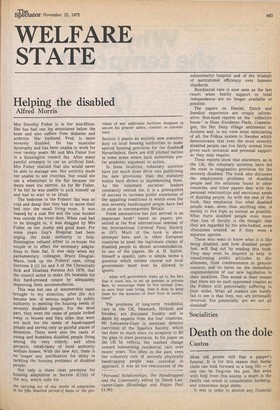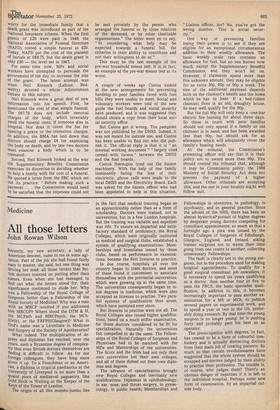Socialities
Death on the dole custos
Most old, people still fear a pauper's funeral. It is for this reason that burial clubs can look forward to a long life — if one can be forgiven the pun. But even with help from this source, a death in the family can result in considerable hardship, and sometimes large debts.
It was in order to abolish any financial
worry for the immediate family that a death grant was introduced as part of the National Insurance scheme. When the first grants of £20 were paid in 1949, the National Association of Funeral Directors (NAFD) costed a simple funeral at £20. Today, NAFD put the cost of the plainest of burials at £69.75, but the death grant is Only £30 —. the level set in 1967.
For some time now, MPs and social workers have attempted to persuade the government of the day to increase the size Of the grant. The latest attempt was When Neil Kinnock (Labour, Bedwellty) devoted a whole Adjournment bebate to this subject.
Neil Kinnock wove a great deal of new information into his speech. First, he questioned the cost of that simple funeral. The £67.75 does not include removal Charges of the body, which invariably swell the funeral costs, if someone dies in hospital. Nor does it cover the fee for Opening a grave or the cremation charges. In addition, the BMA has laid down that doctors should charge £4 for examining the body on death, and by law two doctors must examine a body which is to be cremated.
Second, Neil Kinnock looked at the way the Supplementary Benefits Commission exercises its discretion in deciding whether to help a family with the cost of a funeral. He quoted a letter from the SBC which set out its practice: "Before making such a Payment . . . the Commission would need to be satisfied that the expenses could not be met privately by the person who arranged the funeral or by close relatives of the deceased, or by other charitable organisations." The letter went on to say, "In considering what help may be expected towards a funeral bill, the criterion is their ability to contribute and not their willingness to do so."
This must be the last example of the pre-war household means test. It is, in fact, an example of the pre-war means test at its worst.
A couple of weeks ago Custos looked at the new arrangements for preventing hardship to poor families faced with fuel bills they were unable to meet. Social and voluntary workers were told of the new guide the fuel boards and social security have produced, and it was suggested they should obtain a copy from their local soc, ial security office.
But Custos got it wrong. The pamphlet was not published by the DHSS. Indeed, it was not meant for outside use, and Custos has been unable to find out who did publish it. The official reply is that it is " an internal working document" "largely cont cerned with liaison" between the DHSS and the fuel boards.
Custos thereupon tried out the liaison machinery. With the help of one family imminently facing the loss of their electricity, phone calls were made to the local DHSS and the Electricity Board. Each was asked for the liaison officer who had been appointed to help in this situation. "Liaison officer, luv? No, you've got the wrong number. This is social security."
One way of preventing families losing their power is to see if they are eligible for an exceptional circumstances addition to their weekly allowance. The basic weekly scale rate contains an allowance for fuel, but no one knows how much, except the Supplementary Benefits Commission, and they won't let on. However, if claimants spend more than this unknown amount, they may be eligible for an extra 30p, 60p or 90p a week. The size of the additional payment depends both on the claimant's health and the home which he has to heat. If a bed-ridden claimant lives in an old, draughty house, he may well qualify for the 90p.
But the full 90p will only keep a -one-bar electric fire burning for about three days. So those in touch with poor families should not only appeal if a family or old claimant is in need, and has been awarded less than 90p, but should ask for an allowance which will adequately cover the family's heating needs.
At the tribunal, the Commission's presenting officer will say that it is their policy not to award more than 90p. You should remind the tribunal that, although it may be Commission policy, the 1966 Ministry of Social Security Act does not prevent the payment of a higher allowance. Other tribunals are accepting this, and the one in your locality mht well follow suit.













































 Previous page
Previous page